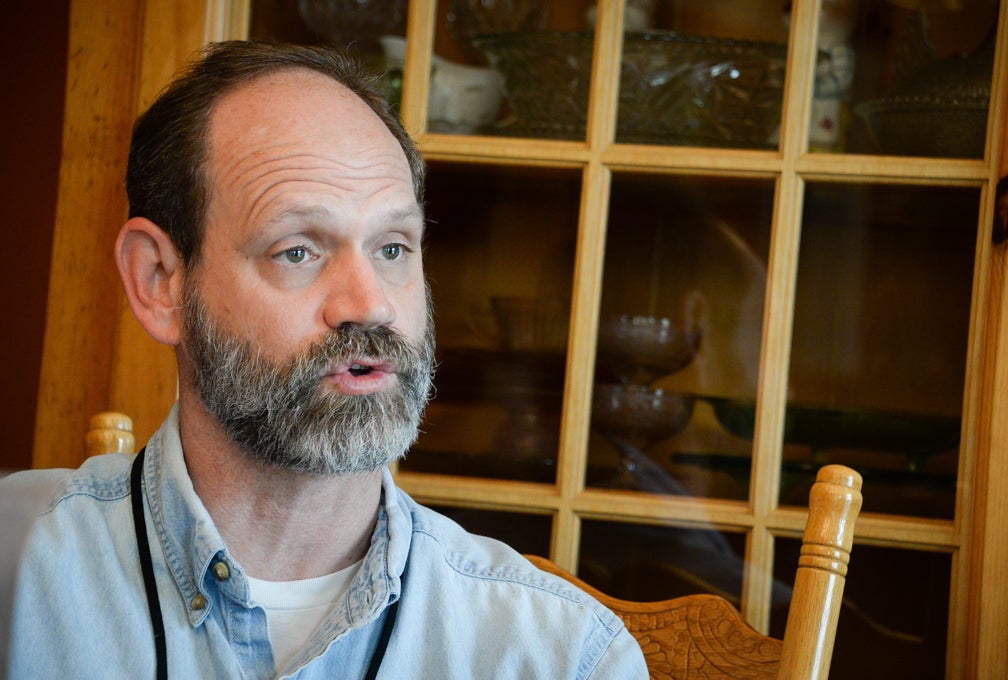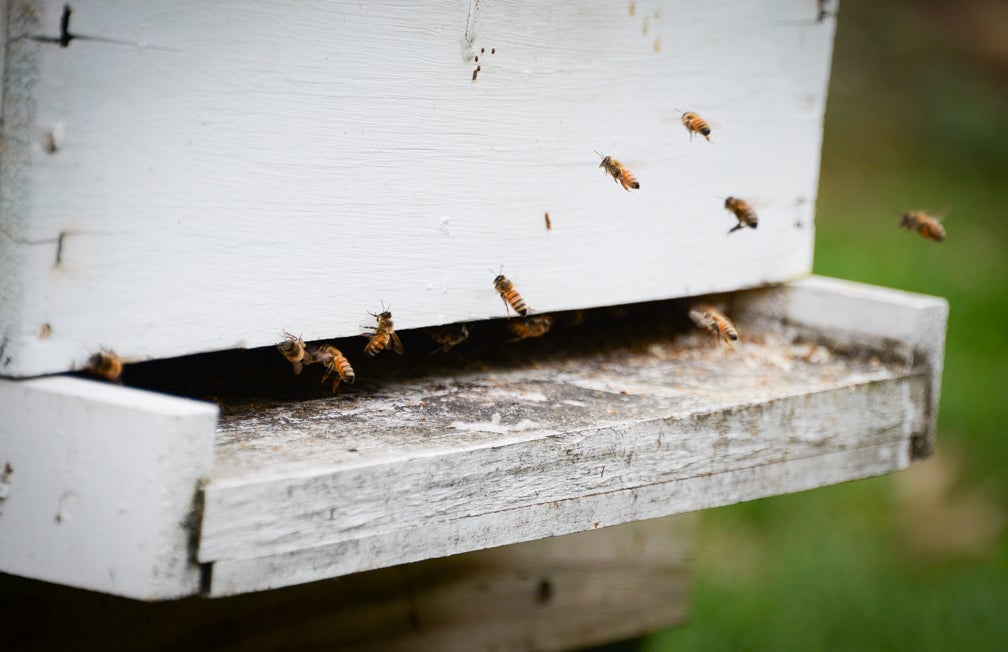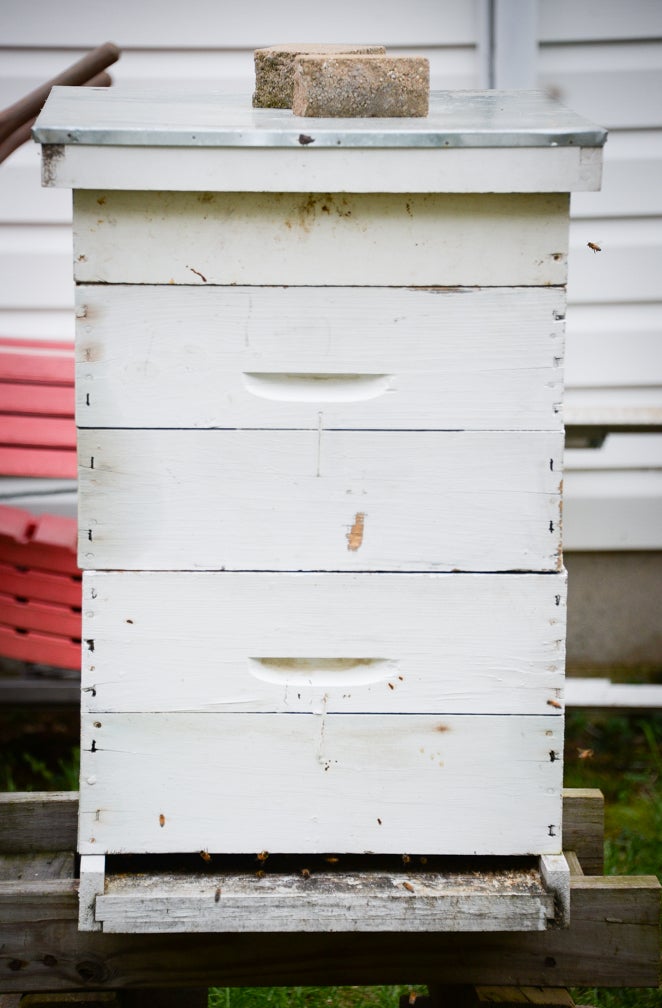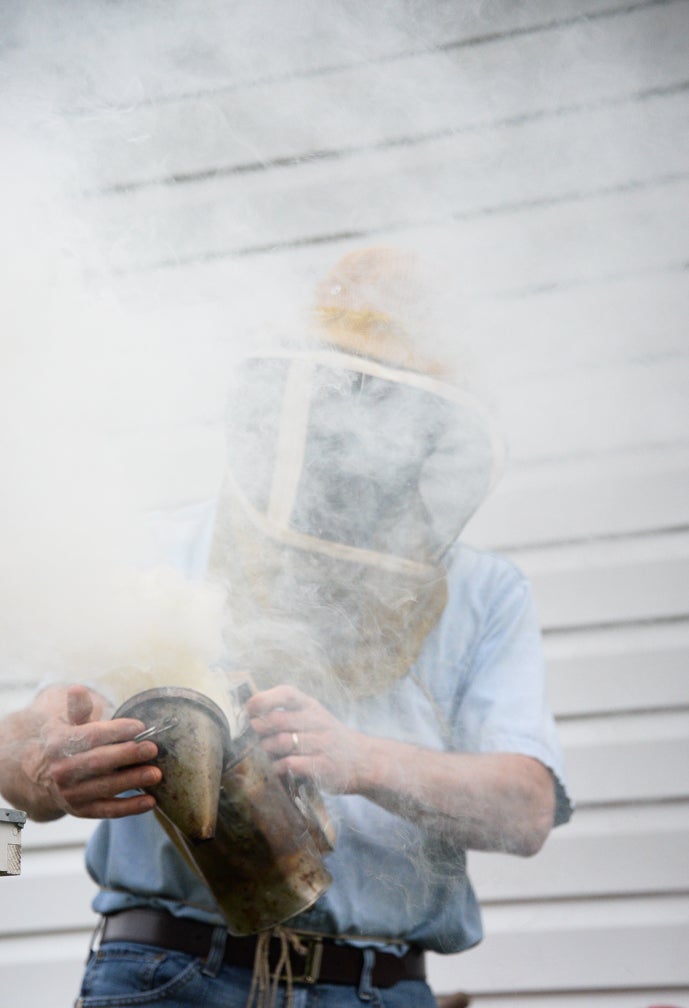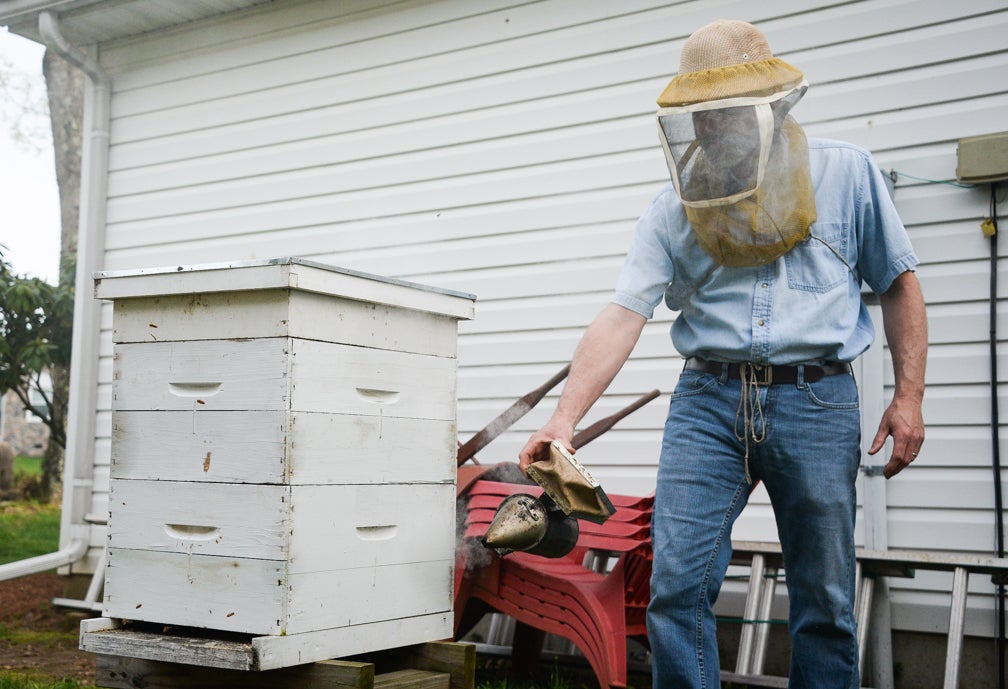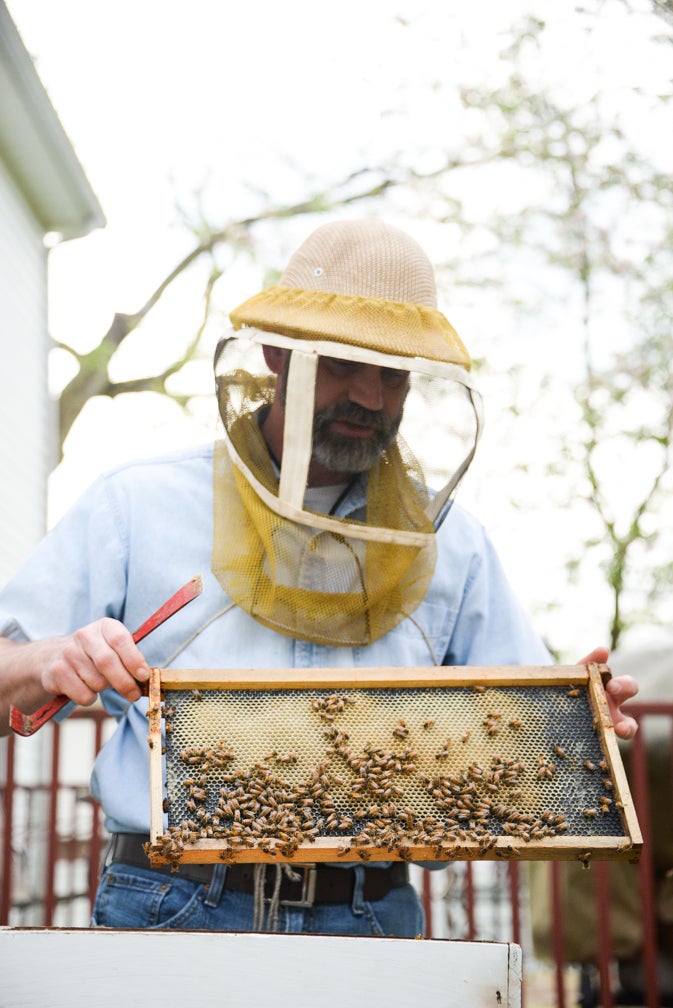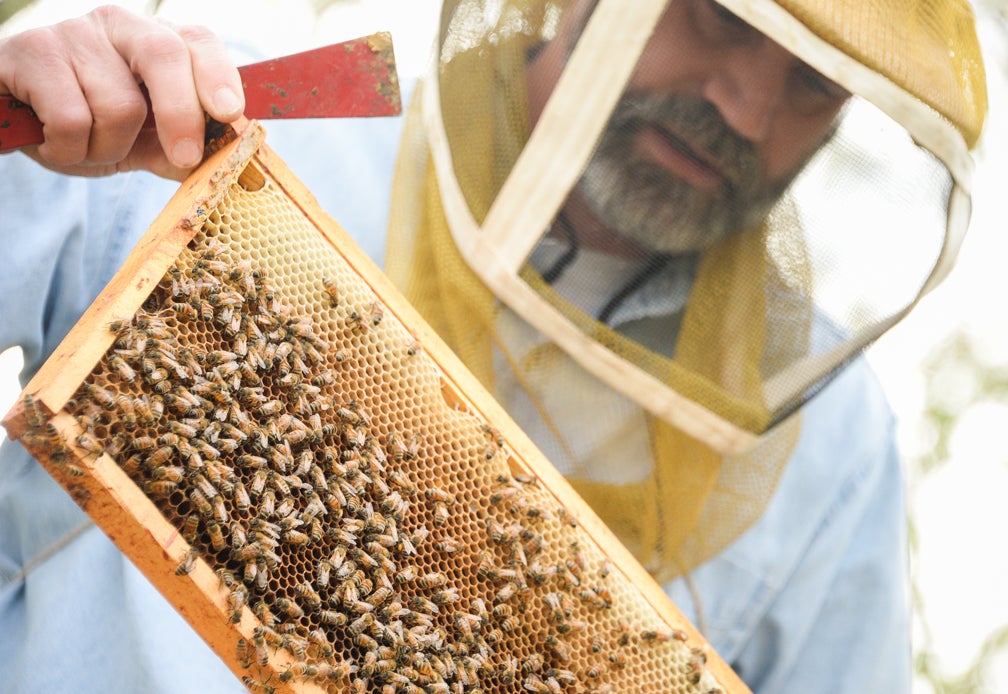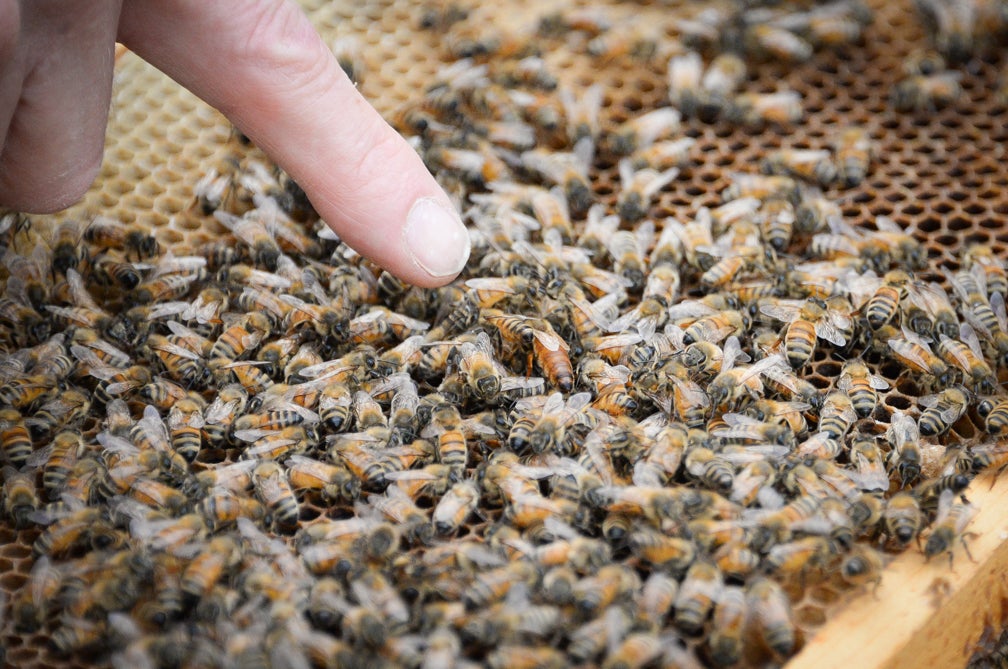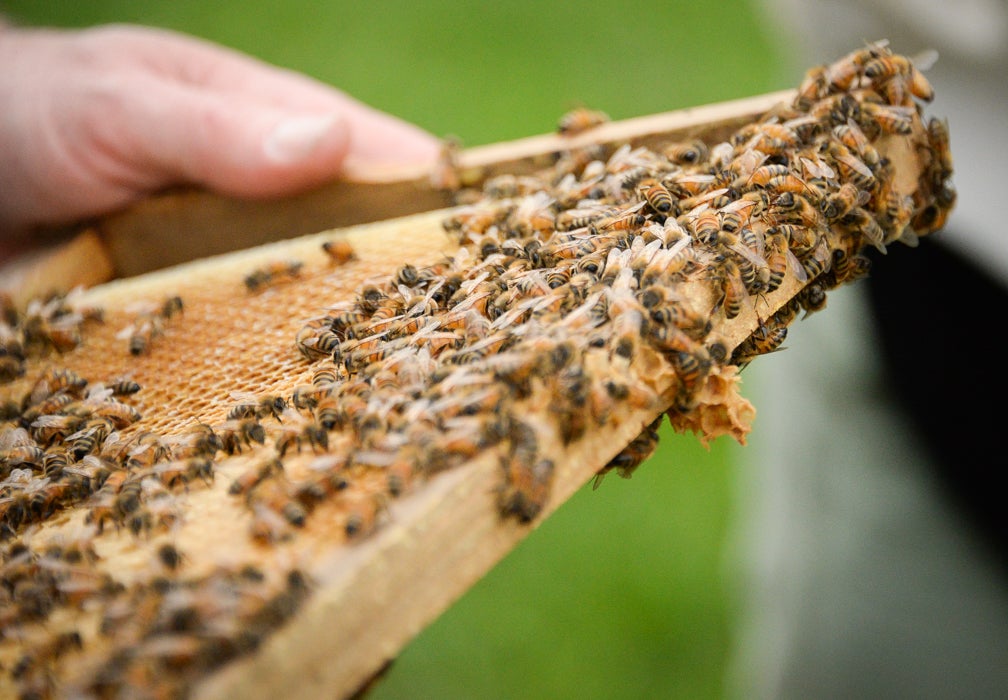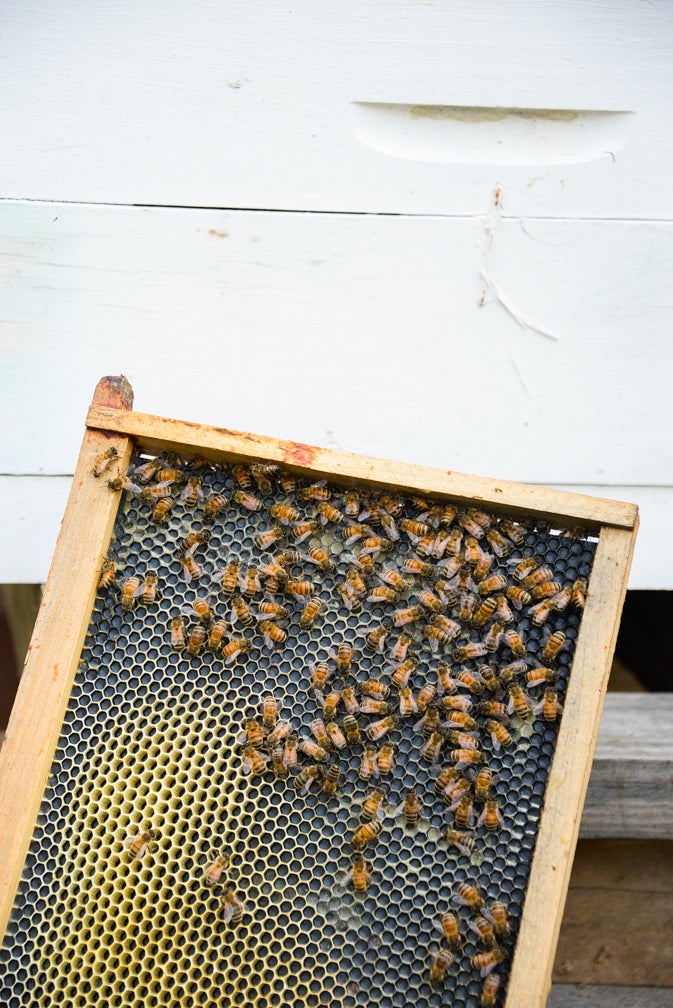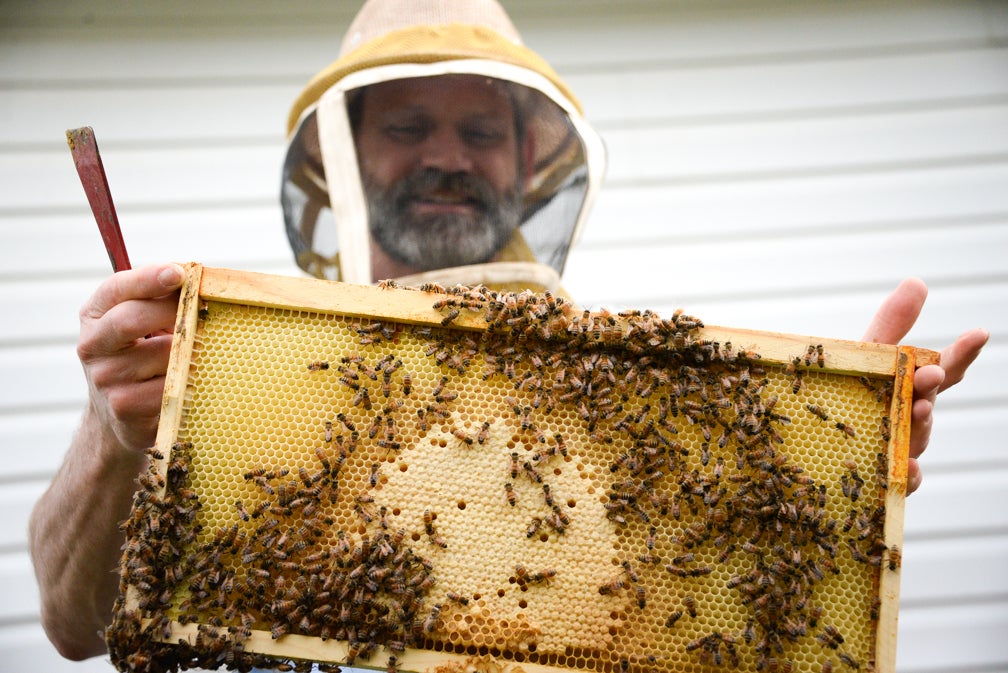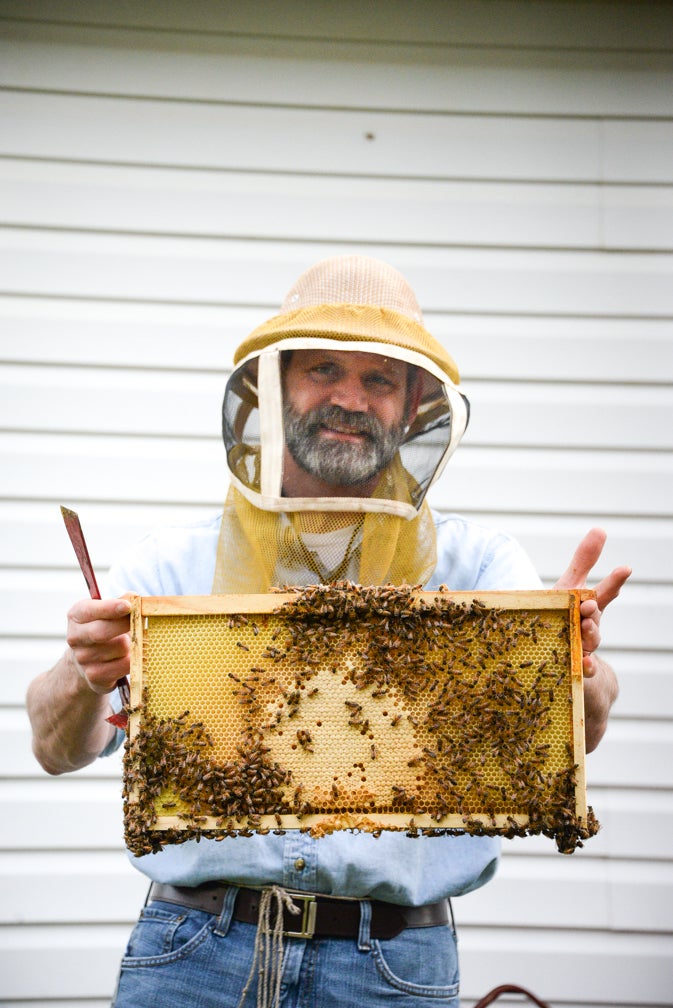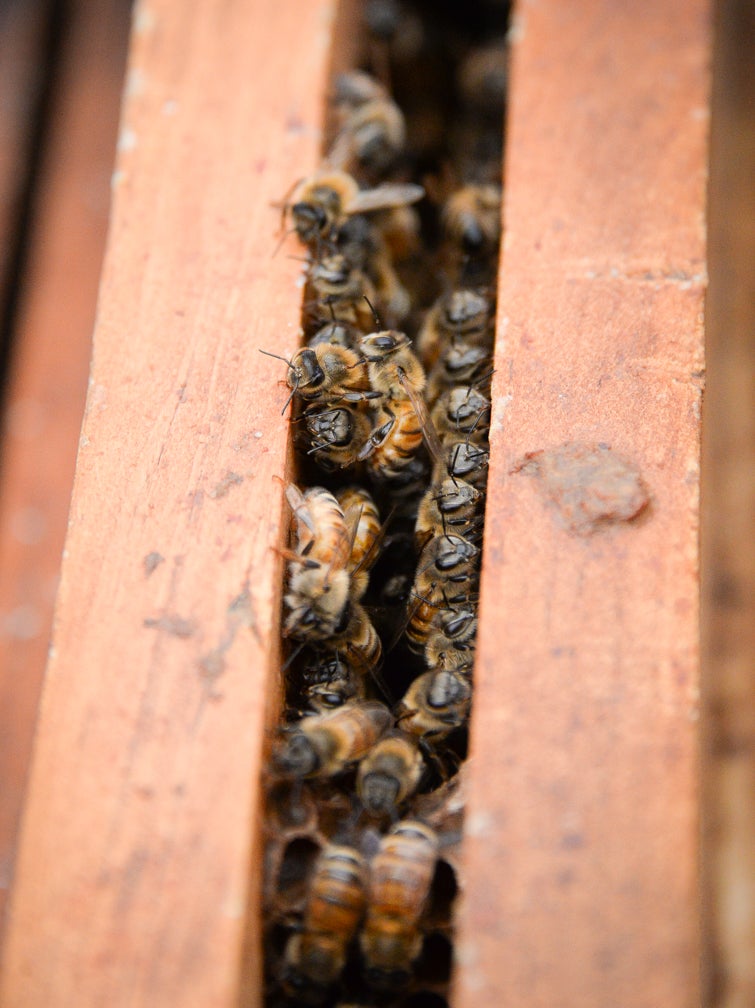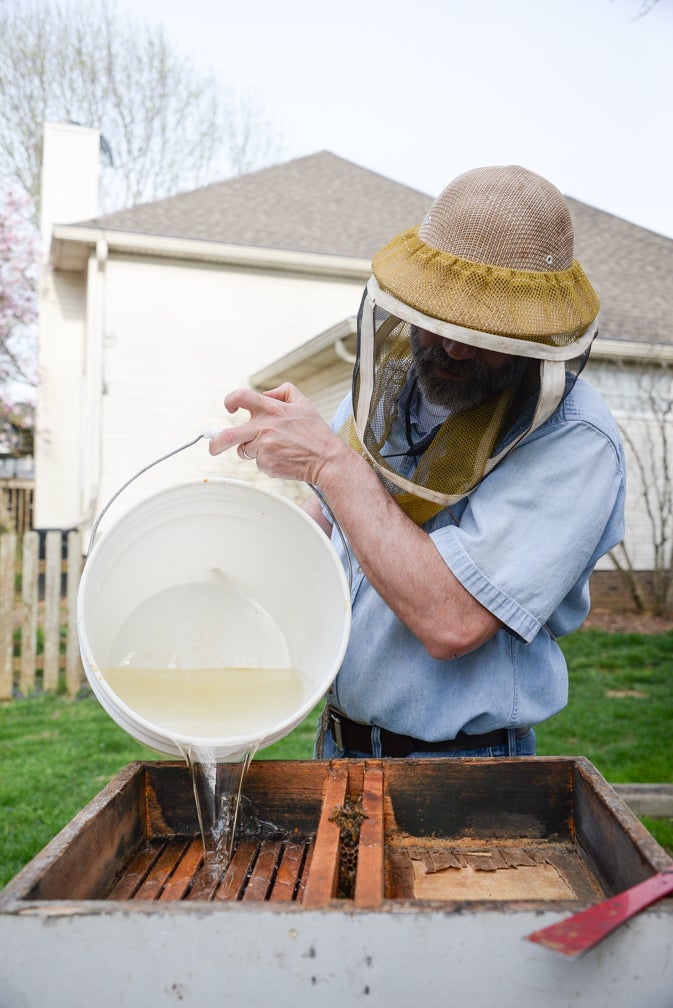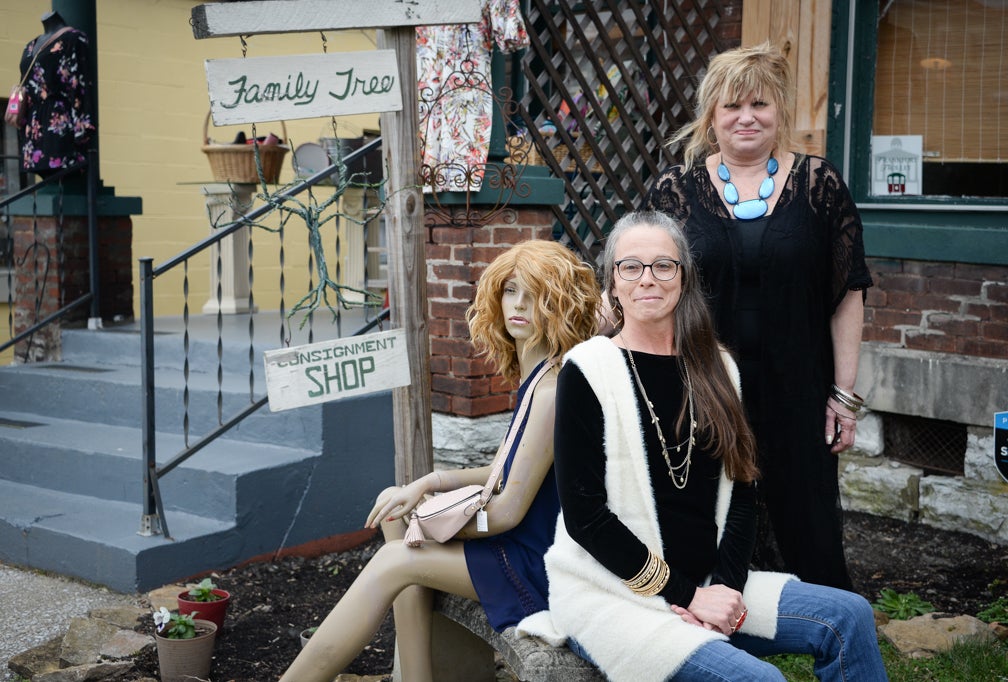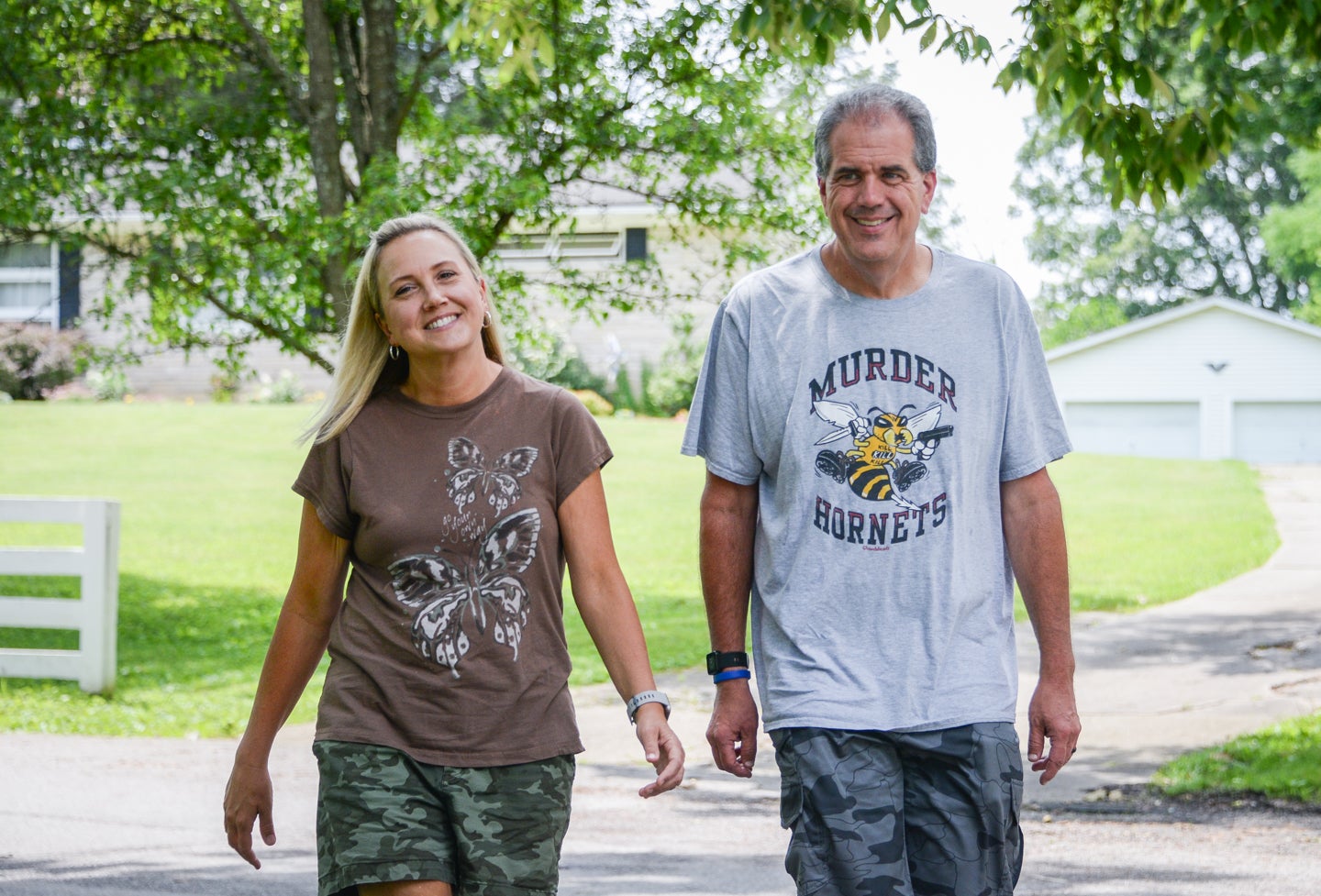Story by Liz Carey and photos by Hannah Brown,
Wes Henry’s backyard looks like any other suburban backyard with the exception of one thing — a bee hive near his garage door.
When he checks on it, he wears a beekeeper’s veil to cover his face, but his arms and legs are sometimes exposed.
“The first time I got stung, it swelled up and hurt like crazy, but you get used to it,” he said. “If you know what you’re doing, they won’t sting you.”
Henry uses a bee smoker — a canister that blows smoke into a hive — to calm down his hive while he lifts the lid off to check on the food for the hive. Bees dart in and out, flying out to gather pollen or scouting out the area, but none of them land on Henry. The smoke, he says, keeps them in check.
Beekeeping, like Henry does at his Frankfort home and in other locations near it, is a growing hobby in the U.S. The U.S. Department of Agriculture estimates more than 212,000 people engage as beekeepers as either a hobby or part-time job selling the honey and wax the bees make. Beekeepers like Henry say it’s a way for them to get in touch with nature and in some cases with their heritage, but, they say, it isn’t a hobby for everyone.
A technician with Pitney Bowes, Henry has four hives — the one in his backyard, two on a farm outside Franklin County and one on property owned by Dadant & Sons Beekeeping Supplies. The hobby provides him with honey and beeswax, but more importantly gives him the opportunity to do something he has always been interested in.
“I was always interested in the outdoors, and raising bees was just something I always wanted to do,” he said. “In 2011, I said, ‘if I’m going to do it, I need to just do it.’ I read up on it and did my research, and finally, I started my first hive.”
Now the president of the Capital City Beekeepers Association, he sells his Summer’s Bird Honey as a hobby. Last year, he says, he brought in almost 200 pounds of honey, but every year is different.
But, getting to that point takes time, Andrew Fogg with Dadant & Sons said. The Kentucky branch of the national beekeeping supply house, Dadant Sons provides bees to Kentucky, Ohio, Indiana, West Virginia and a few other states, and helps beekeepers from novices to commercial growers with their hives.
“It really is a fun hobby and something you can do in your backyard,” Fogg said. “But it’s not as simple as putting bees in a box and getting honey.”
Boxes of bees
Fogg says those interested in becoming beekeepers should do their research first, and then purchase their equipment in the spring. Equipment ranges from protective gear to bee smokers to brood chambers and stands. Once you’ve put together your hive you’re ready to purchase bees, he says.
“Bees won’t wait for you to be ready for them,” he says.
Bees come in 3-pound packages. In mid-April, Dadant’s shipment of package bees arrived at the warehouse, ready to be delivered to customers. Constructed of chicken wire and wood, the boxes buzzed as the bees flew around inside of them, each containing between 9,000 and 12,000 bees, and one queen. On delivery day this year, 450 boxes arrived at the warehouse, located at 955 Chenault Road — roughly 4.5 million bees in total, separated from customers and volunteers by only thin sheets of wire.
And, it’s going to be a while before you get the fruits of the bees’ labor — sweet, rich, local honey.
“That first year, you’re just going to be getting the colony going,” Fogg said. “You’ve got to get them prepared so they can make it through the winter … If you’re going into beekeeping, throw instant gratification out the window. Once you have a hive and they have an established home, you need to feed them for the winter. If you’re lucky, you’ll get honey in your second year. If you try to get it before that you may wind up pushing the hive to make something they’re not ready to do.”
During that time, you have to learn the behavior of the bees and learn how to avoid getting stung. Fogg started beekeeping after watching his grandfather raise bees on his farm.
“I remember my grandfather raising bees, and I remember being around them as a kid,” Fogg said. “I always ask people who are interested in raising bees, ‘What do you do when you see a bee? Do you start swatting at them or are you calm and just let them be?’ That’s going to determine a lot whether or not you’re going to get stung.”
But, getting stung is part of the game, Fogg said.
“What I’d tell new beekeepers is that it’s a labor of love. Bees are going to get all over you … You’re going to sweat and you may get hurt,” he said. “You’re going to get stung. And, you’re going to kill bees. It’s just a fact of nature.”
Not getting stung depends on the beekeeper. For some, that may mean protective gear. For others, like Henry, that may mean smoke. Others still say it’s knowing your bees that counts.
Buzzing with love
“It’s a zen thing for me,” says Kathy Stephanski, one of the Capital City Beekeepers helping out at Dadant on package bee day. “You have to have no anger, no bad vibes when you check on the hive, or those bees are going to eat you alive. I think I have to go out there with no stress and put all of my anxiety behind or they are going to come out aggressively. I’ve had to walk away before because they were coming after me.”
Stephanski, a former IT employee with the state of Kentucky, says she started raising bees to get honey.
“I really started because of my love of local honey, and it not being very abundant,” she says. “I was driving to Lexington to get local honey. But I live on a farm, so I thought, ‘Why not have bees?’ I already had cows and sheep and goats and chickens. They are like any other agricultural crop.”
Stephanski says she checks on her bees about once every 10 days to make sure that they have the food they need and aren’t under threat from either other bugs or the weather. Of the four hives she had last year, she says, three survived, but one froze over the winter.
For Bill Dickerson, another member of the Capital City Beekeepers, raising bees has been a way for him to help the environment, even though he jokes that he may not be doing as well as he’d like.
“I’ve been killing bees for 10 years,” he jokes. “There’s so many things that can go wrong with a hive. It’s more like you’re meddling with nature, and if you’re not doing it right, the results can be disastrous.”
Dickerson says he got into beekeeping to help the bees.
“I was reading about the bees having a hard time,” he says. “I thought I would start some hives to help them out and help out the environment. Now they produce a lot of honey. It’s not much, but it is a way to recover some of the expense in raising bees.”
In his Frankfort backyard, Henry says beekeeping is not an inexpensive hobby. He estimates that you will invest about $350 in equipment and then another $150-$200 in bees.
Paying off in multiple ways
But the payoff is in learning about bees, as much as it is in getting honey, he says.
“People think the queen is the one in charge, but she’s really a slave to the hive,” he said. “Like chickens, she only has so many eggs and when she’s no longer viable, they kick her out. She will lay about 1,000 eggs a day. That’s her job.”
The bees can teach us, he said, how to be better people.
“When you’re beekeeping, you can learn from the bees and their colonies. They are industry and thrift, as Poor Richard said …,” he said. “Everything they do is for that colony. The worker bees will literally work themselves to death for the colony.”
And while beekeepers may make the most from the fruits of the bees’ labor — namely honey — they will learn from them as well, returning the honeycomb back to the colony so they can make more honey, and helping the bees to survive through difficult times.
“There’s a romance quality to beekeeping,” Henry said. “There’s something about getting back to the Earth and of being able to have your own honey. It helps you appreciate and have awareness of nature and of environmental issues.”
And above it all, beekeepers don’t control bees, he said, they just provide them with a place to stay.
“Bees are wild animals,” he said. “They come and go as they please. We can’t fence them in. They go whereever they want. They do what they want. What we do is we learn what they need and try to provide that so they will stay.”

